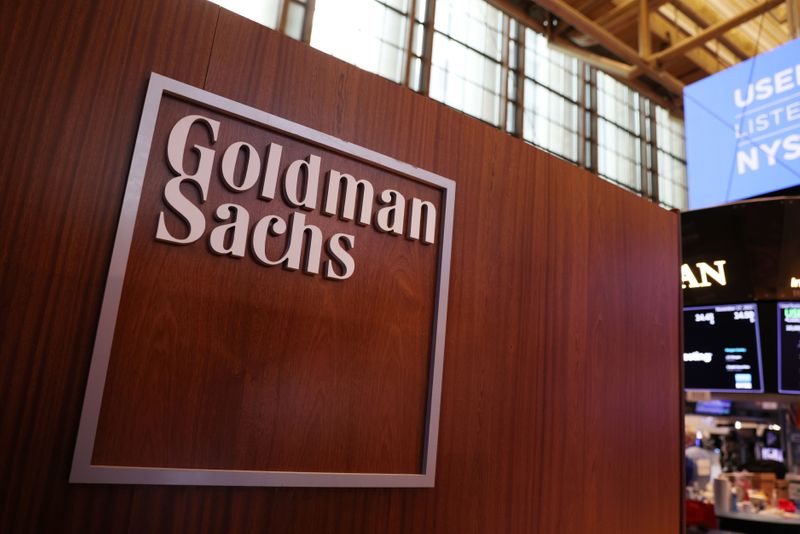Investing.com --Goldman Sachs releases its latest quarterly results in difficult circumstances, while retail sales will provide clues of the health of the U.S. consumer. County Garden nears debt default, while oil markets look to Venezuela for potential supply.
1. Goldman Sachs likely to report weak quarter
The quarterly corporate earnings store kicks into top gear this week, and influential investment bank Goldman Sachs (NYSE:GS) is in the firing line before the U.S. open later Tuesday.
A number of Goldman’s peers – JPMorgan Chase (NYSE:JPM), Wells Fargo (NYSE:WFC) and Citigroup (NYSE:C) – reported quarterly profits on Friday that outstripped analysts' estimates boosted by higher interest rates.
However, Goldman looks likely to disappoint as deal-making lags and the bank retreats from a loss-making consumer business.
The bank wrote down $485 million on its commercial real estate assets in the second quarter, and something similar looks likely this time around. Provisions for losses on credit cards will also hit profits.
The lender is expected to report third-quarter earnings per share of $5.31, according to average estimates compiled by LSEG, which would reflect a 36% decline from its EPS of $8.25 a year earlier.
2. Futures largely flat as earnings season develops
U.S. stock futures traded marginally lower Tuesday, consolidating after the previous session's gains as investors looked forward to a busy week for quarterly corporate earnings.
At 05:00 ET (09:00 GMT), the Dow futures contract dropped 90 points or 0.3%, S&P 500 futures fell 12 points or 0.3%, and Nasdaq 100 futures slipped 40 points or 0.3%.
The major indices posted strong gains on Monday, with the broad-based S&P 500 index gaining over 1%, as confidence was boosted by a positive start to the third quarter earnings season.
The financial sector will remain in focus Tuesday, with numbers from Bank of America (NYSE:BAC) and Goldman Sachs [see above] before the open.
Pharmaceutical giant Johnson & Johnson (NYSE:JNJ) is also expected to report earnings this session.
Microsoft (NASDAQ:MSFT) is also set to be in the spotlight after the tech giant’s LinkedIn unit said it would lay off 668 employees, more than 3% of the 20,000-strong staff, in the second round of job cuts this year for the social media network for professionals amid slowing revenue growth.
Tesla (NASDAQ:TSLA) has been asked to recall almost 55,000 Model X vehicles manufactured between 2021-2023 as the vehicle controller is likely to fail to detect low brake fluid and not display a warning light.
There are also fresh economic numbers to digest, including retail sales [see below] and industrial production data for September.
3. U.S. retail sales in focus
There exists a great deal of uncertainty over the Federal Reserve’s next interest rate move, especially after headline U.S. consumer prices grew at a faster-than-anticipated rate in September.
The U.S. retail sales figures for September, due later in the session, could provide more clues as it will give investors insight into the strength of consumer spending, which drives around two-thirds of the economy.
Economists expect a gain of 0.3% from August, and core sales are expected to climb 0.2% for the month.
A stronger-than-expected reading could stir fears of a rebound in inflation and add to the view that the Federal Reserve will need to keep rates higher for longer.
4. County Garden moves closer to default
County Garden is moving closer to a major debt deadline, as the default risk surrounding China’s largest property developer grows.
Country Garden's entire offshore debt will be deemed to be in default if the company fails to make a $15 million coupon payment later Tuesday, the end of a 30-day grace period.
Non-payment of this tranche is set to trigger cross defaults in other bonds as is standard in bond contracts.
Country Garden warned last week about its inability to meet offshore debt obligations, and with nearly $11 billion of offshore bonds and $6 billion of offshore loans, a default would set the stage for one of China's biggest corporate debt restructurings.
5. Oil market looks to Venezuela for supply
Oil prices steadied after the previous session’s slide on hopes the U.S. would ease sanctions on producer Venezuela, potentially easing the tight global supply situation.
By 05:00 ET, the U.S. crude futures traded 0.2% higher at $85.44 a barrel, while the Brent contract climbed 0.3% to $89.89.
The crude market slid around $1 a barrel on Monday after Reuters reported, citing multiple sources, that Venezuela’s government and the opposition plan to resume long-suspended talks on Tuesday.
This could eventually see Washington relax its sanctions on oil exports from this Organization of Petroleum Exporting Countries member, which had been put in place following highly disputed elections in 2018.
Both oil benchmarks surged last week on fears the conflict in the Middle East could widen, with Brent gaining 7.5% in its highest weekly gain since February.
U.S. President Joe Biden will make a visit to Israel on Wednesday as the country prepares a large-scale ground invasion of Gaza as part of an offensive against Hamas militants.
Israel is not a big player in terms of crude production, but any potential escalation could impact supplies from other countries in the world's top oil producing region, including Saudi Arabia, Iran and the United Arab Emirates.
